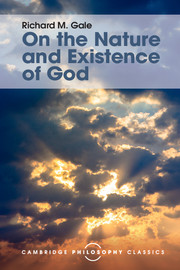Preface to this edition
Published online by Cambridge University Press: 05 July 2016
Summary
Richard Gale wrote this book to clarify and assess various influential arguments against and for God's existence. The book's positive role is to contribute to “a more adequate conception of God – a God that will prove a worthy object of worship and obedience, even if the case for believing in his existence is shaky” (p. 3). Accordingly, the book examines some atheological arguments, such as the deductive argument from evil and arguments from divine immutability against divine omniscience and creation. These arguments call for “a more adequate conception of God's nature” than that offered by traditional theism.
The book's negative role is to identify the inadequacy of some influential arguments for God's existence, or at least arguments for justifying belief that God exists. These arguments include ontological arguments, cosmological arguments, pragmatic arguments, and arguments from religious experience. None of these arguments fares well, according to Gale, but he avowedly ignores “inductive arguments based on design, beauty, and lawlike regularity and simplicity for the existence of God, as well as those based on evil to show the improbability of his existence” (p. 1). So, he reports: “Since I completely eschewed inductive arguments, no definite conclusion can be drawn regarding the rationality of faith.” Instead, he identifies some blind alleys in the rational pursuit of the issue of God's existence.
Gale seems content with the absence of a rational justification for belief that God exists. He reports being inspired by “Hume's Philo,” adding that it is “the sceptical Philo whose spirit imbues my book” (p. 2). Still, Gale acknowledges the influence of Kierkegaard (no skeptic about God's existence). He suggests that the absence of a rational justification for belief that God exists “would be welcomed by a wide range of Kierkegaardian types who completely eschew any attempt to give an ‘objective’ justification of faith.” He adds: “I resonate to their view of faith as a subjective passion that outstrips our reason” (p. 387).
Perhaps the problem is not with faith in God, but is with a desired “objective justification of faith.” Gale opposes a case for justification of faith on the basis of religious experiences, on the ground that such experiences are not “cognitive,” that is, “alone would not constitute a basis for our gaining knowledge of some objective reality” (p. 287).
- Type
- Chapter
- Information
- On the Nature and Existence of God , pp. ix - xPublisher: Cambridge University PressPrint publication year: 2016



